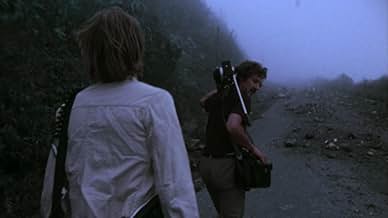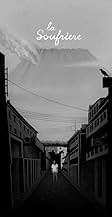Herzog takes a film crew to the island of Guadeloupe when he hears that the volcano on the island is going to erupt. Everyone has left, except for one old man who refuses to leave. Herzog ca... Read allHerzog takes a film crew to the island of Guadeloupe when he hears that the volcano on the island is going to erupt. Everyone has left, except for one old man who refuses to leave. Herzog catches the eeriness of an abandoned city, with stop lights cycling over an empty intersecti... Read allHerzog takes a film crew to the island of Guadeloupe when he hears that the volcano on the island is going to erupt. Everyone has left, except for one old man who refuses to leave. Herzog catches the eeriness of an abandoned city, with stop lights cycling over an empty intersection.
- Director
- Writer
- Stars
- Awards
- 2 wins total
- Director
- Writer
- All cast & crew
- Production, box office & more at IMDbPro
Featured reviews
The Potential, the Danger
I think not. I am coming to the opinion that in addition to all the other variety in films we find, films are weighted differently in their strategies for what rewards the viewer.
An example of this are the films that are otherwise lackluster, but have a particularly intriguing ending. All they have to do is keep you from rebelling through the film, which is all about setting up that end. You wander out of the theater dazzled, and that is the experience you recall.
Other films are all weighted on the entry. The filmmaker takes us to strange and wonderful places. Its actually not difficult to create those places. What's difficult is getting us there in the first few moments of a film. The thrill is all in the beginning of these, and much of the charm of being a tourist in these strange environs is the fact that you are there at all.
I think there is a small catalog of these strategies, just as you can say that there are only a few of what we call genres, which in fact are a collection of conventions agreed upon between the makers and viewers. And which are used as shorthandles in the cinematic grammar.
One of these the film reward types are films that aren't compelling as films themselves, but the idea of the film is. Perhaps there are several types within this. I suspect so, one of them having to do with the nature and intent of the filmmaker. I have a small study of one sort of these, where the filmmaker (usually a man) features the woman he loves in the film. Knowing that changes everything.
Herzog may have invented his own type, or at least be the modern exemplar. I've spent some time recently with films about the antarctic, because of my fascination with Frank Hurley. He was a photographer/filmmaker who about 100 years ago accompanied Shackleton on an expedition to the south pole. Even if the journey had been successful, it would have been hard, incredibly hard. But it turned disastrous. The story is one of the most amazing in history, but during this whole time, Hurley kept his cameras active.
Seeing these are transformative because you know the man put himself in harms way, encountered danger and hardship and STILL took those photos (the movie camera being too heavy to keep). Its the IDEA of the photograph, not the things themselves.
Here we have Herzog. He hears that a volcano is to blow. An entire island has been evacuated, streetlights still operating, TeeVees still on. The mountain is seething. Scientists know an eruption exceeding a nuclear bomb is certain. They have the example of a neighboring island where just the same preface presaged disaster. What does Herzog do? Why rush there of course with two cameramen.
He breaks rules, he cheats, he sneaks past barriers to actually climb the mountain where if the wind is blowing right the acidic clouds won't dissolve his lungs. And he waits for the thing to blow. As it turns out it didn't. The mountain settled and the people resettled. But the very idea. It isn't the sort of journalism that war correspondents practice, where we really need to know and danger is involved. Its different.
Herzog went there because the story was in his going.
Ted's Evaluation -- 3 of 3: Worth watching.
Uniquely atmospheric
It's a great premise and you can instantly see why Herzog was attracted to this story: the images of the deserted town are haunting in the extreme, and nature plays a big part. Unforgettable shots include snakes evacuating the volcano slopes and dead dogs lying rotting in the lonely streets. The human stories which conclude this brief report are even more devastating, a study of loneliness and the acceptance of fate. All of these are themes commonly explored by Herzog, and they're just as intriguing here.
Great Early Herzog
The conversations with the people left behind were a little hard to follow, but still interesting. If a guy has nowhere to go, why should he leave? It's his home and, in the end, the volcano didn't interrupt after all. Vindication if there ever was.
Check it out. It's only 30 minutes anyway.
Very Good
*** 1/2 (out of 4)
German documentary has Herzog taking his film crew to the island of Guadeloupe when he hears that a volcano is about to erupt and people there aren't wanting to leave even though it might cost them their lives. To be more point on, the entire town has evacuated except for three people who all believe that the volcano is God's will and that when it's their time to go they shouldn't fight it. This is yet another great documentary from the master director. Running just under 30-minutes the film gives us all sorts of great shots of the volcano firing up but in the end, for reason's scientist don't understand, the thing never went off. Herzog narrated the action and at one point he describes the empty and silent city as something you'd see out of a science fiction movie. That's a good way to describe the film because it really does look like something you'd see in a science movie just because of the beauty of the island that is now empty due to a looming threat. We also get a back story of the same volcano erupting in 1903 where 30,000 people were killed. There was only one survivor and how he managed to live is something I won't spoil.
Waiting for an end that never comes on a beautiful island
Herzog has made a film of stark beauty that is also deeply disturbing. There is something about it that is not quite right. Of course it has to do with the fact that the film is like real life Waiting for Godot, we are waiting for the end that never comes, despite all the signs. Its an unnerving proposition that messes with your head, but in a good way. Its 30 minutes well spent.
Did you know
- TriviaDuring a Q&A session at the Eye film museum in July 2023, Ed Lachman stated that he never retrieved the glasses he forgot on La Soufrière.
- GoofsLouis-Auguste Cyparis was not the only survivor of the volcanic eruption-- there were 3 in total, including a young girl and a shoemaker-- and he died in 1929, not 1956.
- ConnectionsFeatured in I Am My Films (1978)
- SoundtracksSiegfried's Funeral Music (from The Ring of the Nibelung)
Composed by Richard Wagner.


























